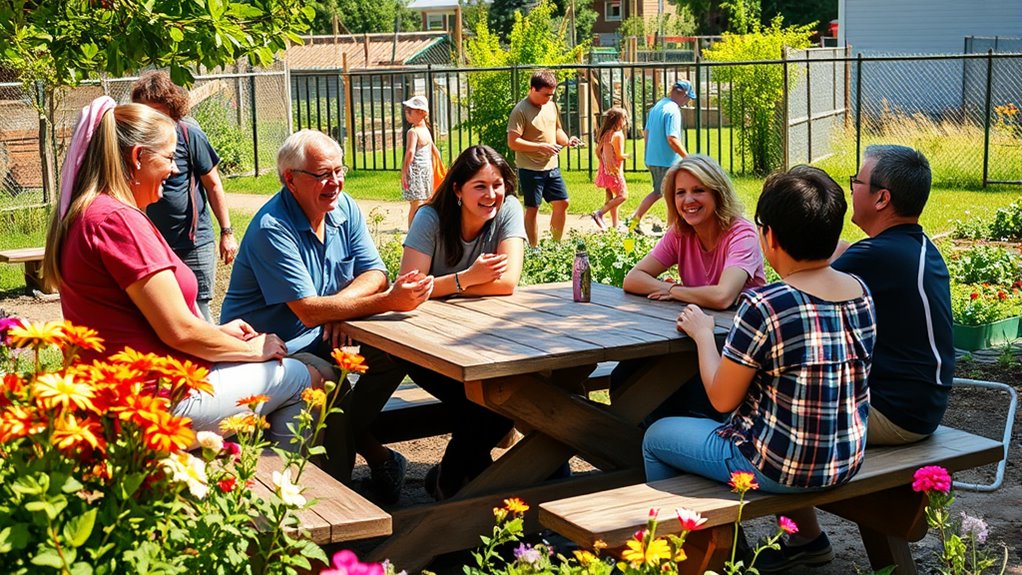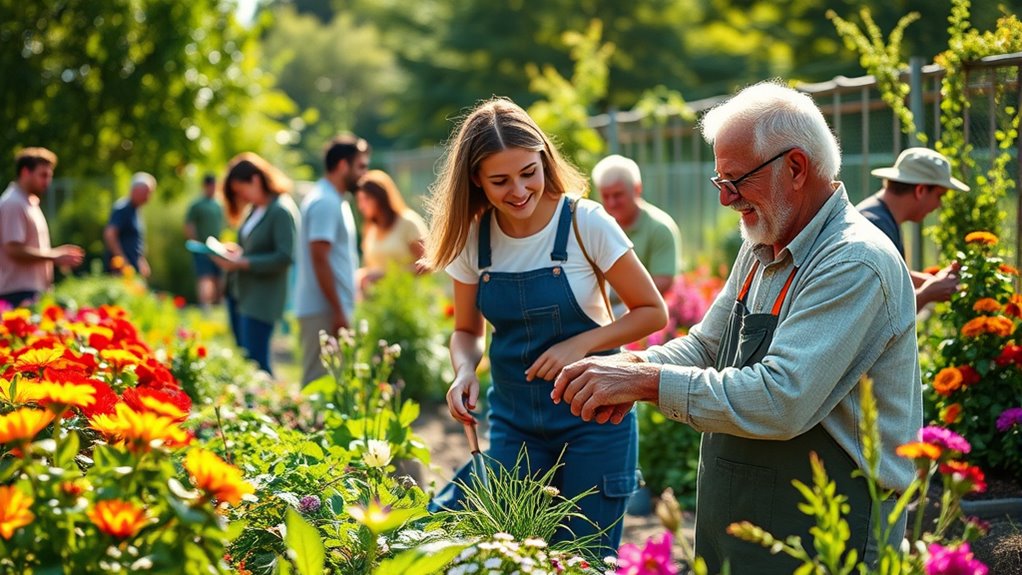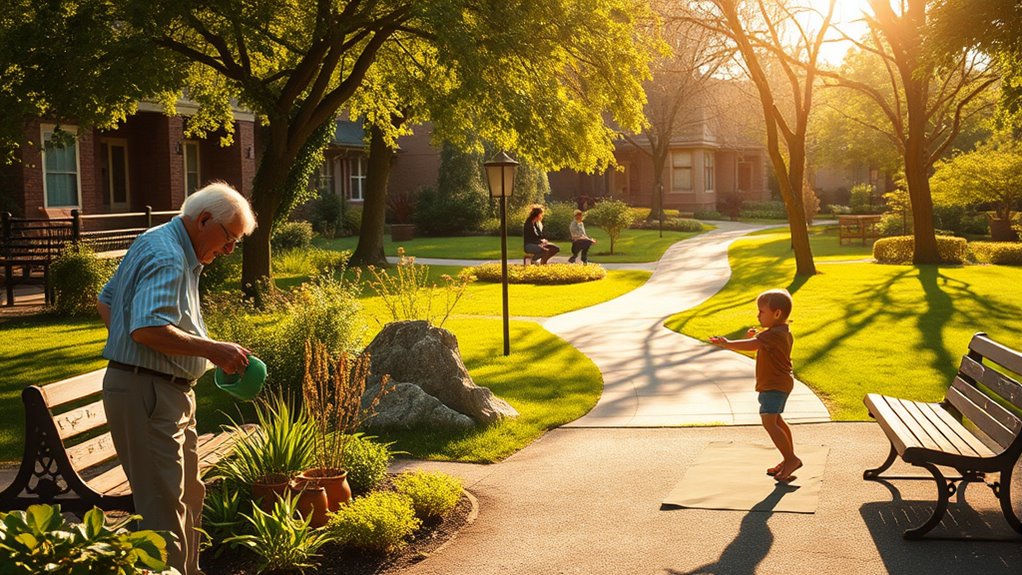To combat loneliness, focus on building deep, authentic relationships by actively listening and showing genuine curiosity. Prioritize in-person interactions and join community activities or groups that match your interests. Use technology mindfully, turning online exchanges into meaningful conversations and scheduling regular face-to-face meetups. Cultivating routines that include social time and practicing self-compassion helps build emotional resilience. Keep exploring these strategies to foster lasting, meaningful connections that enrich your life.
Key Takeaways
- Prioritize in-person interactions like meetups, community events, and volunteering to build genuine connections beyond digital platforms.
- Focus on deep, authentic conversations by active listening, empathy, and showing genuine curiosity to foster trust and emotional bonds.
- Limit digital distractions, schedule regular face-to-face time, and create inviting environments to enhance in-person social experiences.
- Develop shared interests through clubs, hobbies, or collaborative activities to promote meaningful engagement and reduce loneliness.
- Cultivate emotional resilience and self-compassion to navigate setbacks, maintaining authentic relationships and fostering lasting social bonds.
Prioritize Quality Over Quantity in Your Relationships

While having many acquaintances might seem impressive, focusing on cultivating deep, meaningful relationships often leads to greater fulfillment. Instead of spreading yourself thin across numerous superficial connections, invest your time in building trust and understanding with a few individuals. Quality relationships provide emotional support, genuine connection, and a sense of belonging that superficial interactions can’t offer. Prioritize conversations that matter, listen actively, and show genuine interest in others’ lives. Remember, it’s not about how many friends you have, but how deeply connected those friendships are. By focusing on meaningful relationships, you’ll find greater satisfaction, resilience, and a sense of community that enriches your life far more than sheer numbers ever could. Additionally, fostering authentic connections with others can help buffer against feelings of loneliness, especially in an increasingly digital age. Recognizing the importance of personalized interactions and name choices can also strengthen bonds and foster a sense of individuality within relationships. Developing trust and understanding over time builds a solid foundation that sustains these connections through life’s ups and downs. Building mutual respect and engaging in honest communication are essential components of lasting relationships, ensuring that both parties feel valued and understood.
Make Time for In-Person Interactions

To strengthen your connections, make time for regular in-person meetups. Planning these ahead of time helps guarantee they happen and keeps digital distractions at bay. By prioritizing face-to-face interactions, you build deeper, more meaningful relationships.
Prioritize Regular Meetups
Making time for regular meetups is essential for strengthening social connections. When you prioritize consistent face-to-face interactions, you build trust and deepen your relationships. Schedule these meetups into your routine and treat them as non-negotiable appointments. This consistency shows your friends and family that they matter, fostering a sense of belonging. Even short gatherings, like coffee chats or walks, can make a significant difference. Regular meetups help you stay connected emotionally and reduce feelings of loneliness. They also provide opportunities for meaningful conversations, shared experiences, and mutual support. By making in-person interactions a priority, you create a strong foundation for lasting relationships that withstand the challenges of a digital age. Utilizing security features such as password strength indicators and profile management can further ensure your interactions remain safe and private. Additionally, choosing appropriate venues for meetups can enhance comfort and improve the overall quality of your interactions. Incorporating consistent routines into your social habits can further reinforce these bonds and promote long-term connection. Engaging in in-person social activities can also help you meet new people and expand your social network, further reducing loneliness.
Schedule in Advance
Scheduling in advance guarantees you carve out dedicated time for in-person interactions amidst busy lives. When you plan ahead, you prioritize meaningful connections over last-minute cancellations. Set specific dates and times for meetups, making them non-negotiable. This proactive approach ensures you’re consistently engaging with others, reducing loneliness and strengthening bonds. Incorporating home decor elements such as cozy textiles and vintage accents can also create inviting environments for social gatherings. Additionally, understanding the importance of emotional readiness can enhance the quality of these interactions and foster deeper connections. Here’s a simple way to organize your plans:
| Activity | Date & Time |
|---|---|
| Coffee with Sarah | Saturday, 10 AM |
| Walk in the Park | Sunday, 4 PM |
| Dinner with Mike | Friday, 7 PM |
| Book Club Meeting | Wednesday, 6 PM |
Limit Digital Distractions
Digital distractions can easily eat into your time for meaningful in-person interactions, even when you have the best intentions. When your phone buzzes or notifications pop up, it’s tempting to check them immediately, but this pulls you away from the present moment. To make room for real connection, set boundaries around your device use. Turn off non-essential notifications during social outings, and keep your phone out of sight when spending time with others. Create designated tech-free zones or times, like during meals or conversations. By intentionally limiting digital distractions, you allow yourself to be fully present, listen actively, and build deeper connections. Small steps like these can profoundly enhance the quality of your face-to-face interactions and reduce feelings of loneliness. Incorporating awareness of digital distractions and their impact can further motivate you to stay engaged in the moment.
Engage in Community Activities and Groups

Participating in community activities and groups offers a powerful way to build meaningful social connections. By joining local clubs, volunteer organizations, or hobby groups, you create opportunities to meet others with similar interests. These shared experiences foster trust and camaraderie, making conversations easier and more genuine. Engaging regularly helps you feel more connected and less isolated. It also provides a sense of purpose and belonging that digital interactions often lack. Whether it’s a sports team, book club, or neighborhood cleanup, getting involved helps you break out of solitude and develop lasting relationships. Remember, consistent participation is key. The more you participate, the stronger your social bonds become, transforming acquaintances into friends and enriching your social life. Building community support networks can further enhance your feeling of connectedness and resilience during challenging times.
Practice Active Listening and Genuine Curiosity

To build stronger connections, you need to practice active listening and show genuine curiosity about others. Focus fully on the person speaking, avoid distractions, and give your full attention. Nod, use affirming gestures, and respond thoughtfully to demonstrate engagement. Instead of thinking about your next response, truly hear what they’re saying. Ask open-ended questions that encourage elaboration, like “Tell me more about that,” or “How did that make you feel?” Show authentic interest without judgment. This approach helps the other person feel valued and understood. Practicing active listening can also improve your overall mental health by reducing stress and fostering emotional balance. Developing problem-solving skills can help you navigate complex social situations more effectively, leading to deeper connections. Recognizing free crypto opportunities can motivate you to explore new ways to connect and grow in digital communities. Incorporating empathy and understanding into your conversations enhances mutual trust and encourages openness over time. Engaging in mindful communication can further strengthen your ability to connect authentically. Over time, practicing active listening deepens trust and fosters meaningful bonds. Genuine curiosity signals that you care, making conversations more fulfilling and relationships more resilient.
Use Technology Mindfully to Connect

You can use technology to connect more meaningfully by setting clear boundaries on your screen time. Prioritize genuine interactions over passive scrolling or superficial chats. By doing so, you guarantee your digital interactions strengthen your relationships instead of replacing real connection. Being intentional about your social interactions helps foster deeper bonds and reduces feelings of loneliness. Incorporating mindfulness techniques, such as deep breathing exercises during digital communication, can also help you stay present and engaged.
Set Boundaries on Screen Time
While technology can enhance social connections, setting clear boundaries on screen time is essential to guarantee these interactions remain meaningful. You should establish specific times when you disconnect from devices to focus on face-to-face interactions or personal well-being. Avoid constant checking of notifications, which can fragment your attention and dilute the quality of your connections. Consider creating tech-free zones or periods, such as during meals or before bed, to foster genuine engagement. Limiting screen time helps prevent feelings of loneliness caused by superficial online interactions. Instead, it encourages you to be fully present during meaningful conversations. By consciously managing your digital habits, you ensure that your online interactions complement real-life relationships rather than replace them.
Prioritize Genuine Interactions
Using technology mindfully transforms online interactions from superficial exchanges into genuine connections. Instead of aimlessly scrolling or sending quick messages, focus on meaningful conversations that deepen your understanding of others. Take time to listen actively, ask thoughtful questions, and share authentically. Prioritize quality over quantity—engage with people who truly matter, whether friends, family, or new contacts. Limit distractions during conversations to stay fully present. Use video calls or voice chats when possible, as these foster more personal connections than texts alone. Remember, digital tools are just facilitators; your intention and effort determine the connection’s depth. By being intentional and present, you turn fleeting online moments into valuable interactions that combat loneliness and nurture real relationships.
Develop Shared Interests and Hobbies

Developing shared interests and hobbies provides a natural way to strengthen social bonds and foster meaningful connections. When you pursue activities you enjoy, you create opportunities to meet others with similar passions. Join clubs, classes, or online groups related to your interests, and actively participate. Sharing experiences, challenges, and successes helps deepen your relationships. Don’t be afraid to suggest activities or invite others to join you; shared experiences build trust and camaraderie. Keep an open mind and be willing to explore new hobbies—this broadens your social circle and enriches your life. Consistency matters, so try to engage regularly. Over time, these shared pursuits become a foundation for genuine friendships, reducing loneliness and creating a sense of belonging.
Volunteer for Causes That Matter to You

Volunteering for causes that matter to you not only makes a positive impact but also creates opportunities to connect with like-minded people. When you choose to donate your time, you build genuine relationships rooted in shared values. Engaging in volunteer work can boost your sense of belonging and reduce loneliness. To get started, consider these options:
Volunteering fosters meaningful connections and a sense of community through shared passions.
- Join local community clean-up events or environmental projects.
- Volunteer at shelters, food banks, or charities supporting vulnerable populations.
- Offer your skills to organizations needing expertise, like tutoring or tech support.
- Participate in fundraising activities or awareness campaigns for causes you care about.
Be Authentic and Open in Your Communications

Building genuine connections relies on honesty and openness in your interactions. When you share your true thoughts and feelings, you foster trust and deepen relationships. Don’t be afraid to show vulnerability; it invites others to do the same. Listen actively and respond with sincerity, making conversations meaningful rather than superficial. Express your opinions honestly, even if they differ, while remaining respectful. Being authentic helps others see the real you, which encourages mutual understanding. Remember, openness isn’t about oversharing but about genuine communication. When you’re honest, you create a safe space for others to do the same. Over time, this authenticity builds stronger bonds and reduces feelings of loneliness, making your social connections more fulfilling and resilient.
Establish Routines That Foster Social Opportunities

Creating routines that include social activities makes it easier to connect with others regularly. When you build consistent habits, social opportunities become natural parts of your life. To get started:
Establishing regular social routines helps foster meaningful connections effortlessly.
- Schedule weekly meetups with friends or family to catch up.
- Join a local club or class that aligns with your interests.
- Volunteer regularly at community events or organizations.
- Set recurring reminders to reach out to someone you haven’t spoken to in a while.
Cultivate Self-Compassion and Emotional Resilience

Developing self-compassion and emotional resilience is essential for maintaining healthy social connections, especially during challenging times. When you treat yourself with kindness and understanding, you’re better equipped to handle setbacks and disappointments without withdrawing from others. Building resilience helps you bounce back from emotional stress and maintain a positive outlook, which makes social interactions more genuine and less strained. Practice mindfulness to stay present and recognize your feelings without judgment. Celebrate your strengths and forgive your mistakes, fostering a compassionate inner dialogue. As you strengthen these qualities, you’ll find it easier to reach out, share vulnerably, and nurture meaningful relationships. Ultimately, self-compassion and resilience create a solid foundation that supports lasting social bonds, even amidst life’s inevitable ups and downs.
Frequently Asked Questions
How Can I Overcome Social Anxiety to Form Deeper Connections?
To overcome social anxiety and form deeper connections, start by challenging negative thoughts about social situations. Practice small steps, like initiating brief conversations or joining low-pressure groups. Focus on active listening and genuine curiosity about others. Gradually, build your confidence by celebrating small successes. Remember, everyone feels nervous sometimes, and with patience, you can create meaningful relationships that enrich your life. Keep pushing forward, and don’t be afraid to seek support.
What Are Effective Ways to Reconnect With Old Friends?
To reconnect with old friends, start by reaching out with a sincere message or call, expressing genuine interest in their lives. Share a memory or ask about recent experiences to reignite the bond. Be open, honest, and patient as you rebuild trust. Suggest meeting up or chatting regularly. Remember, authentic effort and consistency help deepen your connection, making your friendship stronger than ever.
How Do I Balance Online and Offline Relationships Healthily?
You might be surprised how often balancing online and offline relationships feels like a natural dance. To do it healthily, set specific times for digital interactions, ensuring they don’t replace face-to-face moments. Be intentional about in-person meetups, and keep real-world conversations meaningful. Remember, authentic connections thrive when you’re fully present, so prioritize quality over quantity. Striking this balance helps you enjoy the best of both worlds without feeling overwhelmed.
What Signs Indicate I Need to Improve My Social Skills?
If you notice you’re avoiding social situations, feeling anxious when talking to others, or struggling to keep conversations flowing, these signs suggest you should work on your social skills. You might feel misunderstood or find it hard to connect genuinely. Recognizing these signs is the first step. Practice active listening, ask open-ended questions, and seek opportunities to engage more confidently to build stronger, more meaningful connections.
How Can I Maintain Meaningful Relationships During Busy Periods?
Imagine your relationships as delicate plants needing regular watering. During busy times, carve out small moments—text a quick message, share a funny meme, or schedule brief calls. Prioritize quality over quantity, focusing on genuine interactions. Keep a mental note of important dates and show you care. Even when your schedule’s tight, consistent small gestures help your connections grow stronger and stay vibrant amid life’s chaos.
Conclusion
By building bonds beyond the screen, embracing empathy, and engaging earnestly, you can banish loneliness and boost your well-being. Prioritize meaningful moments over many meaningless ones, make time for genuine gatherings, and practice patience with yourself. Remember, fostering fulfilling friendships fosters a flourishing you. With mindful methods and motivated mindfulness, you’ll master the art of authentic connection, transforming solitude into a symphony of shared support and sincere satisfaction.









